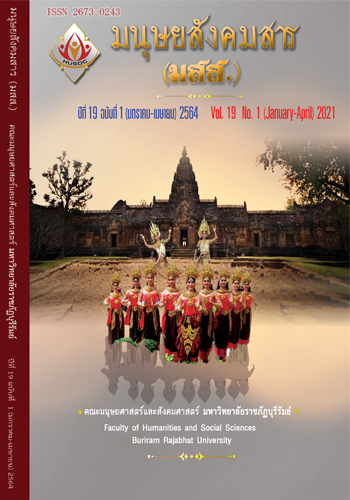The Effects of Using Instructional Package for Practicing English Reading Comprehension Skill through Cooperative Learning Technique CIRC with Mind Mapping of Eighth Grade Students
Main Article Content
Abstract
The purposes of this research were as follows: 1) to study the efficiency of instructional package for practicing English reading comprehension skill through cooperative learning technique CIRC with Mind Mapping set 75/75, 2) to compare students learning achievement before and after learning through the instructional package for practicing English reading comprehension skill 3) to find out effectiveness index of the package and Mind Mapping 4) to study the students’ satisfaction towards using instructional package and Mind Mapping of 8th grade students. The samples were 36 students in class 2/1 of Nongkipittayakom School Selected by using cluster sampling. The instruments used in this study were: 1) the 6 instructional packages 2) lesson plans 3) learning achievement test 4) the questionnaire. The research results : 1) The efficiency of the instructional package for practicing English reading comprehension skill was 80.94/83.75 which was higher than the criteria set 75/75. 2) The 8th grade students had higher achievement after leaning than before learning at the .05 level of statistically significant difference. 3) The effectiveness index equaled 0.6929 which showed that the student’ learning achievement progress was at 69.29% 4) The satisfaction of the 8th grade students as a whole was at the high level.
Article Details

This work is licensed under a Creative Commons Attribution-NonCommercial 4.0 International License.
เนื้อหาและข้อมูลในบทความที่ลงตีพิมพ์ในวารสารทดสอบระบบ ThaiJo2 ถือเป็นข้อคิดเห็นและความรับผิดชอบของผู้เขียนบทความโดยตรงซึ่งกองบรรณาธิการวารสาร ไม่จำเป็นต้องเห็นด้วย หรือร่วมรับผิดชอบใดๆ
บทความ ข้อมูล เนื้อหา รูปภาพ ฯลฯ ที่ได้รับการตีพิมพ์ในวารสารทดสอบระบบ ThaiJo2 ถือเป็นลิขสิทธิ์ของวารสารทดสอบระบบ ThaiJo2 หากบุคคลหรือหน่วยงานใดต้องการนำทั้งหมดหรือส่วนหนึ่งส่วนใดไปเผยแพร่ต่อหรือเพื่อกระทำการใดๆ จะต้องได้รับอนุญาตเป็นลายลักอักษรจากวารสารทดสอบระบบ ThaiJo2 ก่อนเท่านั้น
References
Fakkao, S. (2001). Student-centered learning management. Bangkok: Aimphan Press. [in Thai]
Important of English. (2016). Retrieved on 2 January 2016 from https://englishgang.com [in Thai]
Jiravarapong, B. (1987). Principle and theory of educational technology. Bangkok: Amorn Karnpim. [in Thai]
Khemmani, T. (2011). Science of teaching: Knowledge of efficient learning process management. Bangkok: Chulalongkorn University Press. [in Thai]
Kuanhavech, B. (1999). Educational innovation (4th ed.). Bangkok: Educational Technology Department Srinakharinwirot University. [in Thai]
National Institute of Educational Testing Service. (2020). Testing report. Retrieved on 30 April 2020 from http://www.newonetresult.niets.or.th/AnnouncementWeb/Login.aspx
Rangubtook, W. (1999). Student-centered planning (2nd ed.). Bangkok: L.T. Press. [in Thai]
Reading Comprehension Technique. (2016). Retrieved on 29 January 2016 from http://wutthiphongkhamnet [in Thai]
Ritcharoen, W. (2008). Researching for learning development: Classroom research. Bangkok: College of Teacher Education Phranakhon Rajabhat University. [in Thai]
Sariwat, L. (2014). Psychology for teacher. Bangkok: O. S. Printing. [in Thai]
Soontornrot, W. (2006). Innovations for learning. Curriculum and Instruction Faculty of Education Mahasarakham University. [in Thai]
Srisa-ard, B. (2002). Development teaching. Bangkok: Suweeriyasarn. [in Thai]
Srisa-ard, B. (2013). Statistics for Research (5th ed.). Bangkok: Suweeriyasarn. [in Thai]
Suthirat, C. (2009). 80 Innovations of student-centered learning management. Bangkok: Danex intercorparation. [in Thai]
Wolman, T. E. (1973). Education organizational leadership in elementary schools. New Jersey: Prentice – Hall.
Wongyai, W. (1982). Curriculum development and new teaching (3rd ed.). Bangkok: Thanate karnpim. [in Thai]


